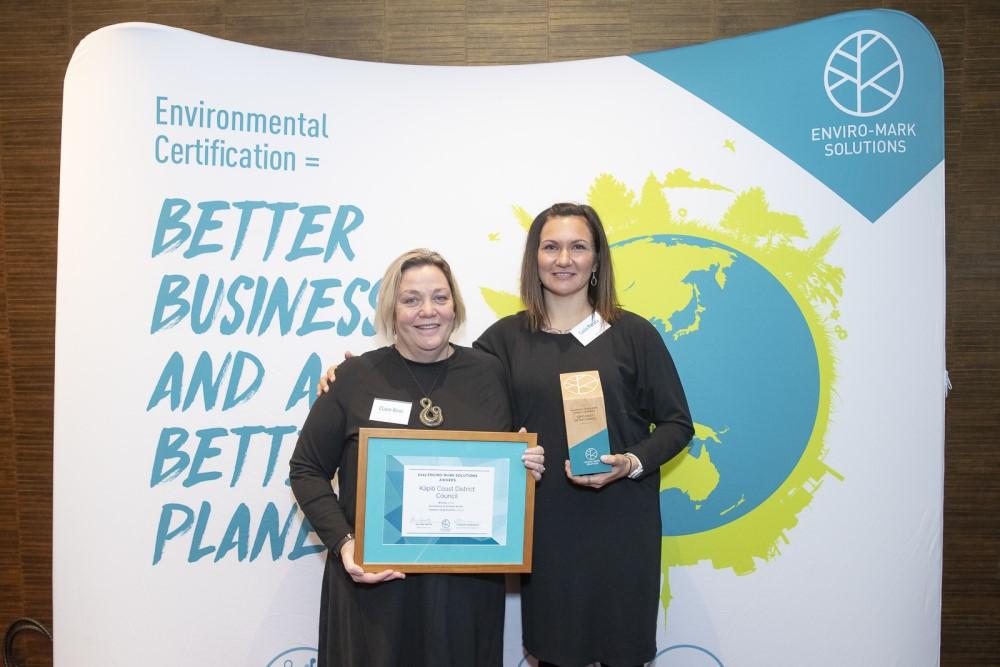The Kāpiti Coast District Council has won the Excellence in Climate Action, Medium Organisation category at the Enviro-Mark Solutions Awards in Auckland.
The Council has reduced its footprint by 76% on base year (2009/10) to 12,498tco2e through a series of bold moves in energy management, including changing the Paraparaumu Wastewater Treatment plant boiler fuel source from diesel powered to woodchip, along with piloting a solar array.

Kāpiti Coast District Council’s Manager, Connected Communities, Tania Parata said the Council’s dedication to the environment is embedded in its culture.
“We are here to serve our communities and that means doing the best we can today to preserve and improve our part of Aotearoa. This culture translates into practical steps that we have taken to measure and reduce our carbon emissions and to look for new, efficient methods to power our organisation,” she says.
“Part of our commitment is tracking and reporting our emissions with the Certified Emissions Measurement And Reduction Scheme® (CEMARS) certification through Enviro-Mark Solutions. This means we can assess how we are faring on the way to our goal of carbon neutrality and have confidence that what we are doing is working.”
Kāpiti Coast District Council has been CEMARS certified since 2012. CEMARS certification tracks how the Council measures, manages and reduces its greenhouse gas emissions.
Enviro-Mark Solutions CEO Dr Ann Smith highlights Kapiti Coast District Council’s incredible achievements in carbon reduction, despite a diverse range of emissions sources.
“Kapiti Coast District Council recognise that climate change will have serious implications for the district, and they are responding with carefully considered urgency. As a council, they manage a diversity of infrastructure and services, so they have used their CEMARS certification to pinpoint where their greatest sources of emissions and therefore biggest opportunities to reduce them. It’s with great pleasure that Enviro-Mark Solutions announces Kapiti Coast District Council as a finalist in the Excellence in Climate Action – Medium Organisation category.”
There are a number of different initiatives that the Council has used to achieve significant reductions in their carbon emissions. A Council boiler thermally dries sludge from the more than 10,000 tonnes of wastewater that the Council processes every day. The change from diesel to woodchips enabled the council to reduce its emissions by 1,140 tonnes of carbon dioxide equivalent (CO2e) per year.
The Council is also in the midst of piloting a 32kilowatt (kw) Photo Voltaic array that has the potential to be scaled up to 300kw. The 32kw array is generating 40,000 kilowatt-hours of energy per year, saving six tonnes of CO2e and $6,500 in energy costs.
The Council is also planning ahead by using upgrades of the electrical systems for the wastewater treatment plant to make provision for alternative power sources and power management in the future.
“By future proofing our processes and systems, we are allowing for the potential to scale up our solar power and share generation during peak energy demand periods,” says Tania.
Kapiti Coast District Council is committed to becoming carbon neutral by 2025 and Tania says the team is feeling confident about achieving this goal.
“Every day we push 25,000 tonnes of water and 10,000 tonnes of wastewater around,” says Tania. “Moving and treating water is energy intensive. We have 147 pump stations across 360km of pipeline. We’ve made sure that a lot of the big ones have power management in place and we are looking at what other gains we can make “around the edges.”
The Council aims for carbon neutrality within six years
- Find out more about the Toitū carbonreduce programme.